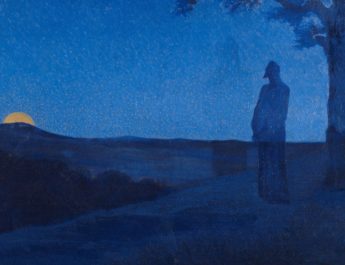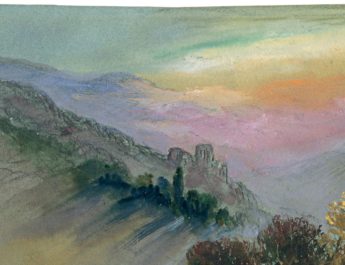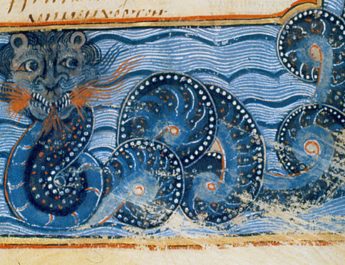Judges 17
BibleHub
1 There wasA a manB in the hill countryC of EphraimD
Notes on verse 1a
A “was” = hayah. This is to be or become, to happen.
B “man” = ish. Perhaps from enosh (human, humankind, mortal); from anash (to be weak, sick, or frail). This is man, husband, another, or humankind.
C “hill country” = har. From harar (hill or mountain). This is mountain, hill, hilly region.
D “Ephraim” = Ephrayim. From the same as epher (ashes or dust – properly something strewn) OR from parah (to grow, increase, be fruitful in a literal or figurative sense). This is Ephraim, one of Joseph’s sons, his descendants, and their land.
whose nameE was Micah.F 2 He saidG to his mother,H
Notes on verses 1b-2a
E “name” = shem. May be from sum (to put, place, set). This is name, fame, renown. A name was thought to indicate something essential about a person – something about their individuality. So, this word can also mean honor, authority, or character.
F “Micah” = Mikahu. Related to “was” in v1. 2x in OT. From Mikayehu (Micaiah; “who is like the Lord?”); {from mi (who, what, which, whoever) + ki (that, for, when, certainly) + Yah (the shortened form of the name of the God of Israel; God, Lord); {from YHVH (proper name of the God of Israel; God, Lord; the self-existent or eternal one); from havah (to become) or hayah (see note A above)}}}. This is Micah or Micaiah, which means “who is like the Lord?” See https://www.abarim-publications.com/Meaning/Micah.html
G “said” = amar. This is to speak, say, answer, command, promise, report.
H “mother” = em. This is a mother as binding a family together or a breeding female animal. It could be mother in a literal or figurative sense.
“The eleven hundredI pieces of silverJ that were takenK from you, about which you uttered a curseL and evenM spokeN it in my hearingO—
Notes on verse 2b
I “eleven hundred” = eleph + meah. Eleph is perhaps from the same as eleph (herd, cattle); from alaph (to learn, speak, associate with). This is thousand. Meah is hundred or some number times one hundred (i.e. hundredfold or the base of two hundred, three hundred, etc.).
J “pieces of silver” = keseph. From kasaph (to long for, be greedy; to become pale). This is silver or money.
K “taken” = laqach. This is to take, accept, carry away, receive. It can also have the sense of take a wife or take in marriage.
L “uttered a curse” = alah. 6x in OT. This is to swear, take an oath, curse – usually negative.
M “even” = gam. This is also, moreover, again.
N “spoke” = amar. Same as “said” in v2. See note G above.
O “hearing” = ozen. This is ear, hearing, audience, show. Properly, it is broadness – applied to its ear in reference to its shape.
thatP silver is in my possession;Q I took it, but nowR I will return it to you.”
And his mother said, “May my sonS be blessedT by the Lord!”U
Notes on verse 2c
P {untranslated} = hinneh. From hen (lo! Behold! If, though; an expression of surprise). This is to draw attention, show suddenness or surprise, or to emphasize the importance of the coming statement. See! Lo! Behold!
Q “in…possession” = et. Literally, “with.”
R “now” = attah. Perhaps from et (a period or season; whenever or continually); probably from anah (to answer, sing, announce); from ad (forever, all, old); from adah (to pass on, advance, decorate oneself). This is now, from now on.
S “son” = ben. From banah (to build or obtain children). This is son, age, child. It is son in a literal or figurative sense.
T “blessed” = barak. This is to kneel, to bless. It is blessing God as part of worship and adoration or blessing humans to help them. It can be used as a euphemism to say curse God.
U “Lord” = YHVH. Related to “was” and “Micah” in v1. See note F above.
3 Then he returnedV the eleven hundred pieces of silver to his mother, and his mother said, “I consecrateW the silver to the Lord from my handX for my son,
Notes on verse 3a
V “returned” = shub. To turn back, return, turn away – literally or figuratively. Doesn’t necessarily imply going back to where you started from. This is also the root verb for the Hebrew word for repentance “teshubah.”
W “consecrate” = qadash + qadash. From qodesh (set apart and so sacred; God is different from us and so God is holy/set apart; things we dedicate to God’s service are set apart for God and so they, too, are holy). This is set apart, consecrated, hallowed, sanctified. This is something or someone that is set apart for a holy purpose or use – ceremonially or morally clean. The word is repeated twice – the first time as an Infinitive Absolute. The Infinitive Absolute serves to emphasize the sentiment of the word. It is rather like Foghorn Leghorn’s speech pattern, “I said, I said.”
X “hand” = yad. This is hand, ability, power. Hand in a literal sense, but also what one can do or the means by which one does it.
to makeY an idolZ of cast metal.”AA
Notes on verse 3b
Y “make” = asah. This is to make, do, act, appoint, become in many senses.
Z “idol” = pesel. From pasal (to hew, carve; used for wood or stone). This is an idol or image.
AA “cast metal” = massekah. From nasak (to cover, pour out, offer; by analogy anointing a king). This is a pouring out or over. So it could be pouring molten metal to cast an image, making a libation (pouring out a drink offering), or otherwise covering.
4 So when he returned the money to his mother, his mother took two hundredBB pieces of silver and gaveCC it to the silversmith,DD who made it into an idol of cast metal, and it was in the houseEE of Micah.
Notes on verse 4
BB “hundred” = meah. Same as “eleven hundred” in v2. See note I above.
CC “gave” = natan. This is to give, put, set, offer. It is to give literally or figuratively.
DD “silversmith” = tsaraph. This is to refine, smalt, or fuse metal. It can also refer to the smelter (goldsmith or silversmith). Figuratively, this is refine in a literal or figurative sense – to test or try, make pure.
EE “house” = bayit. Related to “son” in v2. Probably from banah (see note S above). This is house, court, family, palace, temple.
5 This man MicahFF had a shrine,GG and he made an ephodHH and teraphimII
Notes on verse 5a
FF “Micah” = Mikah. Related to “was” and “Micah” in v1 & “Lord” in v2. From Mikayah (Micaiah, Micah; “who is like the Lord?”); {from mi (see note F above) + ki (see note F above) + Yah (see note F above)}. This is Micah or Micaiah, which means “who is like the Lord?”
GG “shrine” = bayit + elohim. Literally, “house of gods.” Bayit is the same as “house” in v4. See note EE above. Elohim is from Eloah (God, a god); from El (God, a god). This is most commonly used as a name for God. Technically, it’s in the plural, i.e. gods. It can also mean great, mighty, judge, or ruler.
HH “ephod” = ephod. This is an ephod, shoulder piece – perhaps a breastplate or apron. It can refer specifically to a ritual garment worn by the high priest. Alternately, it can refer to an image.
II “teraphim” = teraphim. 15x in OT. Perhaps from rapha (properly, to repair by stitching – figuratively to heal or cure; to make whole). This is a household idol or god. Sometimes it is simply rendered “teraphim.” It can refer to idolatry more generally. It may mean healer.
and installedJJ oneKK of his sons, who becameLL his priest.MM
Notes on verse 5b
JJ “installed” = male + et + yad. Male is fill, satisfy, replenish, accomplish, fulfill, confirm, or consecrate. It is fill in a literal or figurative sense. Yad is the same as “hand” in v3. See note X above.
KK “one” = echad. Perhaps from achad (to unify, continue on a path; figuratively, to gather one’s thoughts). This is the number one, first, united. It can also be alone, altogether, a certain, a few.
LL “became” = hayah. Same as “was” in v1. See note A above.
MM “priest” = kohen. This is literally the one who officiates i.e. the priest. This is where the Jewish last name “Cohen” (and its variants) comes from.
6 In those daysNN there was noOO kingPP in Israel;QQ
Notes on verse 6a
NN “days” = yom. Root may mean being hot. This is the day in a literal or figurative sense. It can also mean birth, age, daylight, continually or other references to time.
OO “no” = ayin. Perhaps from a word that means to be nothing. This means nothing, none, non-existent. It can also simply mean not or are not.
PP “king” = melek. From malak (to be or become king or queen, to rise to the throne, to be crowned; by implication, to take counsel). This is king or royal.
QQ “Israel” = Yisrael. Related to “shrine” in v5. From sarah (to persist, exert oneself, contend, persevere, wrestle, prevail) + El (see note GG above). This is Israel, meaning God strives or one who strives with God; new name for Jacob and for his offspring. This refers to the people and to the land.
all the peopleRR didSS what was rightTT in their own eyes.UU
Notes on verse 6b
RR “people” = ish. Same as “man” in v1. See note B above.
SS “did” = asah. Same as “make” in v3. See note Y above.
TT “right” = yashar. From yashar (to be straight, right, even, smooth, or agreeable; figuratively, to make something pleasant or prosperous). This is straight, right, level. Also, it is pleasing, whether pleasing God or pleasing other people. So, it is upright or righteous.
UU “eyes” = ayin. This is eye in a literal or figurative sense so eye, appearance, favor, or a fountain (the eye of the landscape).
7 Now there was a young manVV of BethlehemWW in Judah,XX
Notes on verse 7a
VV “young man” = naar. May be from na’ar (to shake, toss up and down, tumble around). This is a child or a servant. It is a child in their active years so they could be aged anywhere from infancy to adolescence.
WW “Bethlehem” = Beth lechem. Related to “son” in v2 & “house” in v4. From bayit (see note EE above) + lechem (bread, food, loaf; food for people or for animals); {from lacham (to eat, feed on; figuratively, to battle as a kind of consumption/destruction)}. This is Bethlehem, meaning “house of bread.”
XX “Judah” = Yehudah. Probably from yadah (to throw one’s hands into the air in a gesture of praise); from yad (hand). This is Judah, meaning “praised.”
of the clanYY of Judah. He was a LeviteZZ residingAAA there.
Notes on verse 7b
YY “clan” = mishpachah. From the same as shiphcah (maid, maidservant); root means to spread out. This is one’s circle of relatives – clan, family, kindred.
ZZ “Levite” = Leviyyi. From Levi (Levi; perhaps meaning “attached”; Jacob’s son, his tribe, and descendants); perhaps from lavah (to join, twine, unite, remain, borrow, lend). This is Levite or levitical.
AAA “residing” = gur. Properly, this is the act of turning off the road for any reason. So, it means sojourning, becoming a guest. It can mean being fearful since one is outside of home territory. It can also mean dwelling, living, or inhabiting if one has turned off the root to encamp for a longer duration. This word is where the Hebrew “ger” comes from, which is the word translated “stranger” or “resident alien.”
8 This man leftBBB the townCCC of Bethlehem in Judah to liveDDD wherever he could findEEE a place.
Notes on verse 8a
BBB “left” = halak. This is go, come, walk. It is walk literally and figuratively and includes people and animals. It can be used figuratively for one’s moral life – how we walk according to God’s way or against it. It can also refer to the walk of life as in the course one’s life takes, the choices we make, etc.
CCC “town” = iyr. From uwr (to awaken or wake oneself up). This can mean excitement in the sense of wakefulness or city. Properly, this is a place that is guarded. Guards kept schedules according to watches. This sense of the word would include cities as well as encampments or posts that were guarded.
DDD “live” = gur. Same as “residing” in v7. See note AAA above.
EEE “find” = matsa. This is to find, catch or acquire. It can also mean to come forth or appear. Figuratively, this can mean to meet or be together with.
He cameFFF to the house of MicahGGG in the hill country of Ephraim to carry onHHH his work.III
9 MicahJJJ said to him, “From where do you come?”
He replied,KKK “I am a Levite of Bethlehem in Judah, and I am goingLLL to live wherever I can find a place.”
Notes on verses 8b-9
FFF “came” = bo. This is to enter, come in, advance, fulfill, bring offerings, enter to worship, attack. It can also have a sexual connotation.
GGG “Micah” = Mikah. Same as “Micah” in v5. See note FF above.
HHH “carry on” = asah. Same as “make” in v3. See note Y above.
III “work” = derek. From darak (to tread, march, to walk. Can also mean affixing a string to a box since one needs to step on it to bend it in the process; so also an archer). This is a road as a thing that is walked on. Can be used figuratively for the path that one’s life takes or how one chooses to live one’s life.
JJJ “Micah” = Mikah. Same as “Micah” in v5. See note FF above.
KKK “replied” = amar. Same as “said” in v2. See note G above.
LLL “going” = halak. Same as “left” in v8. See note BBB above.
10 Then MicahMMM said to him, “StayNNN with me, and be to me a fatherOOO and a priest, and I will give you tenPPP pieces of silver a year,QQQ
Notes on verse 10a
MMM “Micah” = Mikah. Same as “Micah” in v5. See note FF above.
NNN “stay” = yashab. This is to sit and so to remain and so to dwell. It is sitting for any reason – as a judge, in order to ambush, or just sitting quietly. Causatively, this can mean settling or marrying. This can also mean continue, endure, or establish.
OOO “father” = ab. This is father, chief, or ancestor. It is father in a literal or figurative sense.
PPP “ten” = eser. Perhaps from asar (to tithe, render a tenth of). This is ten or -teen. While 7 is symbolically the number of perfection, ten is also symbolically a number of perfection (but to a lesser degree than 7 is).
QQQ “year” = yom. Same as “days” in v6. See note NN above.
a setRRR of clothes,SSS and your living.”TTT, UUU 11 The Levite agreedVVV to stay with the man, and the young man became to him like one of his sons.
Notes on verses 10b-11
RRR “set” = erek. From arak (to arrange by setting in a row; to set a battle, estimate, put in order, or compare). This is order, arrangement, price, estimate, value. It refers to something that is brought into order.
SSS “clothes” = beged. From bagad (to cover or conceal; figuratively, to act in a covert or treacherous way, to transgress or pillage). This is clothing, garment, robe, or some other kind of clothing. Figuratively, it can be treachery or pillaging.
TTT “living” = michyah. 8x in OT. From chayah (to live or keep alive literally or figuratively). This is sustenance, reviving, raw, new life.
UUU {untranslated} = halak + Leviyyi. Literally, “the Levite went in.” Halak is the same as “left” in v8. See note BBB above. Leviyyi is the same as “Levite” in v7. See note ZZ above.
VVV “agreed” = yaal. 19x in OT. This to be pleased or willing, determined, to take on something, to try, to do willingly, to begin. It can have the idea of assent or consent as well as continuing or persistingas.
12 So MicahWWW installed the Levite, and the young man became his priest and was in the house of Micah. XXX 13 Then MicahYYY said, “NowZZZ I knowAAAA that the Lord will prosperBBBB me because the Levite has become my priest.”
Notes on verses 12-13
WWW “Micah” = Mikah. Same as “Micah” in v5. See note FF above.
XXX “Micah” = Mikah. Same as “Micah” in v5. See note FF above.
YYY “Micah” = Mikah. Same as “Micah” in v5. See note FF above.
ZZZ “now” = attah. Same as {untranslated} in v3. See note R above.
AAAA “know” = yada. This is to know, acknowledge, advise, answer, be aware, be acquainted with. Properly, this is to figure something out by seeing. It includes ideas of observation, recognition, and care about something. It can be used causatively for instruction, designation, and punishment.
BBBB “prosper” = yatab. This is to be good or pleasing, joyful. It can also mean doing good in an ethical sense or be beautiful, happy, successful, or right.
Image credit: “Did you Have to Leave Me Here?” – Photo by spodzone of the statue “Still” by Robert Mulholland.




